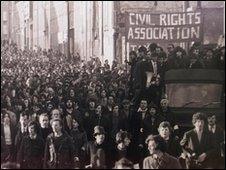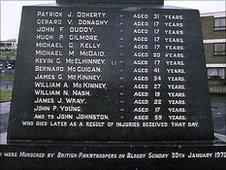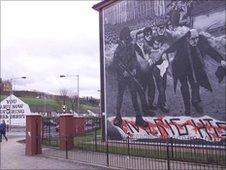Was the Bloody Sunday report value for money?
- Published

Thirteen people died in Londonderry on Bloody Sunday
The Saville Inquiry into the deaths of 13 people on Bloody Sunday has lasted 12 years and cost £195m, making it the longest and most expensive public inquiry in UK history.
Opinion is split over whether the inquiry has been an essential examination of one of the most infamous events of the Northern Ireland Troubles or a pointless waste of money.
Earlier this year, Northern Ireland Justice Minister David Ford said the inquiry had "enriched lawyers but not necessarily achieved anything for the families".
But Michael Mansfield QC, a barrister who represented relatives of some of the victims, said: "The families would say you can't measure any grief and loss of your loved ones in terms of finance and the need to know the truth about what happened was vital to them."
And the Bloody Sunday Trust, which aims to preserve the memory of those who died in the shootings, said: "The issue of costs is the one which has excited most attention of the media and some politicians, not whether the soldiers committed murder or why it took so long for a proper inquiry to take place."
About half the money spent on the inquiry has gone to lawyers. It opened in April 1998 in Londonderry and heard evidence from more than 900 people between 2000 and 2005.
The report was initially planned for release the following year but instead has only been published now, after years of analysis of the evidence heard.
Millions to lawyers
Thirteen people died after paratroopers opened fire during a civil rights march in Derry on 30 January 1972. A 14th person died some time later and his family believe the death was related to injuries he sustained on the day.
An inquiry was held in the weeks after the deaths, chaired by Lord Widgery, but lasted only a month. The Bloody Sunday Trust and Mr Mansfield are both highly critical of it.
The Saville Inquiry has been chaired by Lord Saville, 74, a high court judge.
Among the costs of the inquiry to be revealed in parliamentary debates or written answers are the £34m spent on IT and £26m on accommodation, including hire of venues and office space.
In February 2009, then Northern Ireland Secretary Shaun Woodward revealed the inquiry's lead QC Christopher Clarke had been paid £4.5m and Edwin Glasgow QC, representing the army, had received £4m. About a dozen other individual lawyers received more than £1m.
Unionist victims campaigner Willie Frazer, founder of Families Acting for Innocent Relatives, disputes the cost of the inquiry, claiming it is actually more than £300m - and says it is a waste of money.
Mr Frazer said: "There should have just been a police investigation.
"In South Armagh, 98% of the murders were never solved and in my own family I had five killed and six of my mates, that's almost as many as died on Bloody Sunday.

A memorial in the centre of Derry commemorates those who died
"We've never had anybody prosecuted and compensation was never an issue with us. What's the difference between those killed on Bloody Sunday and our people who were killed doing a day's work?
"We are realistic enough to know that it would do more harm than good because that amount of money could go into hospitals or other investments that would be more use than spending it on the inquiry.
"The only people getting anything out of this are the legal people.
"I just think all this is going to create is a waste of money and more resentment in the communities of Northern Ireland."
In March, Alliance Party leader Mr Ford, who became justice minister the following month, said: "I personally don't think that I am the only individual in Northern Ireland who feels the spending of £200m on enriching lawyers rather than dealing in a different way with the needs of the victims is a fairly ineffective way of dealing with the problem."
But the Bloody Sunday Trust says the inquiry had to be held, being the "only full and detailed investigation" into the events of the day.
The trust compares the Saville Inquiry costs with the £173m Manchester City spent on new players in 2009.
A statement from the organisation said: "A proper police inquiry and an inquest would be taken for granted had (that many) people been shot and killed or wounded in any other part of the United Kingdom, as recent events in Cumbria so tragically underline.
"Hundreds of young men and women joined the IRA as a direct result of what happened on Bloody Sunday and the subsequent Widgery Inquiry.
"Many people died or were imprisoned because of the failings of Widgery.
"This should put any discussion about costs of the Saville Inquiry into perspective."
Mr Mansfield also said the need to find out the truth about what happened overshadowed the cost.

The events of Bloody Sunday are remembered in murals in Derry
He said the Saville Inquiry was unique, having been set up at an important time in the peace process, and was a "stepping stone" to the power sharing agreements now in place.
Mr Mansfield said: "The inquiry wasn't really limited to the 30 minutes or so when the firing took place. They decided it could not be seen in isolation, it was part of a sequence of events and it was necessary to look at why so many thousands of people turned out for a march of this kind.
"It was the families who campaigned for this inquiry and they have to stand very proud."
But the Committee on the Administration of Justice, a human rights organisation based in Belfast, said the length of the process had been traumatic for the families.
Deputy director Aideen Gilmore said: "It is regrettable that the families of those killed on Bloody Sunday have had to wait so long both for an inquiry and for the report of this inquiry.
"If there had been a full and thorough investigation in the first place, and those responsible held to account, the families of victims could have been spared the trauma of such a lengthy delay."